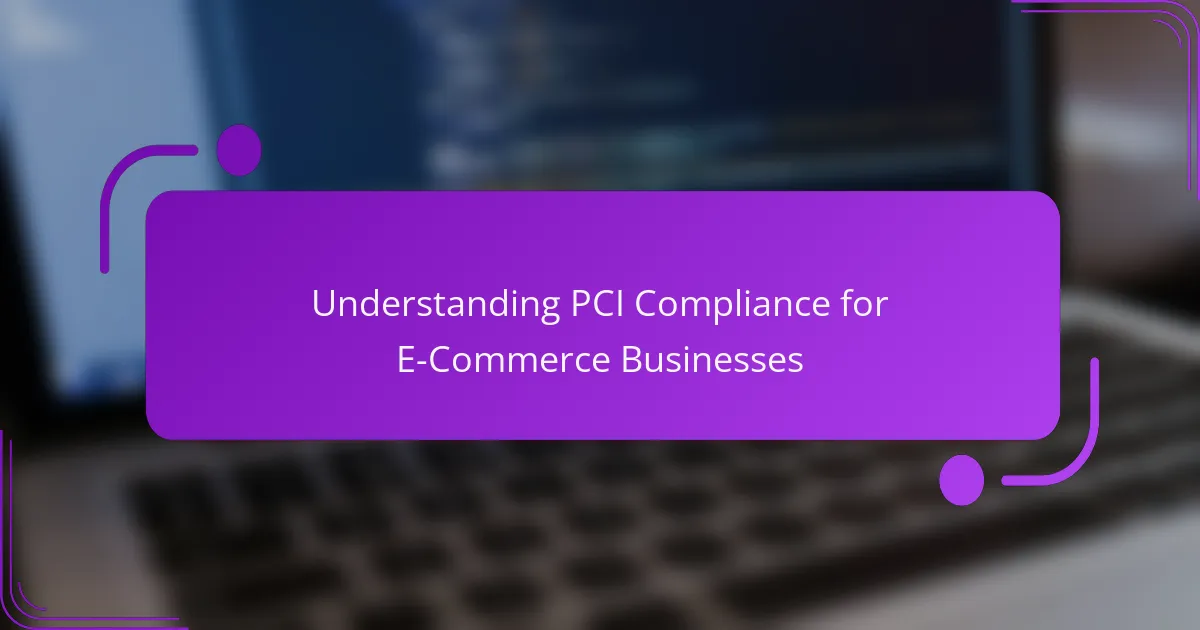Understanding PCI compliance is crucial for e-commerce businesses to protect sensitive cardholder data and maintain customer trust. By implementing best practices such as strong access controls, regular monitoring, and data encryption, businesses can ensure they meet industry standards and safeguard payment information. A structured approach to assessing and enhancing security measures is essential for achieving and maintaining compliance.
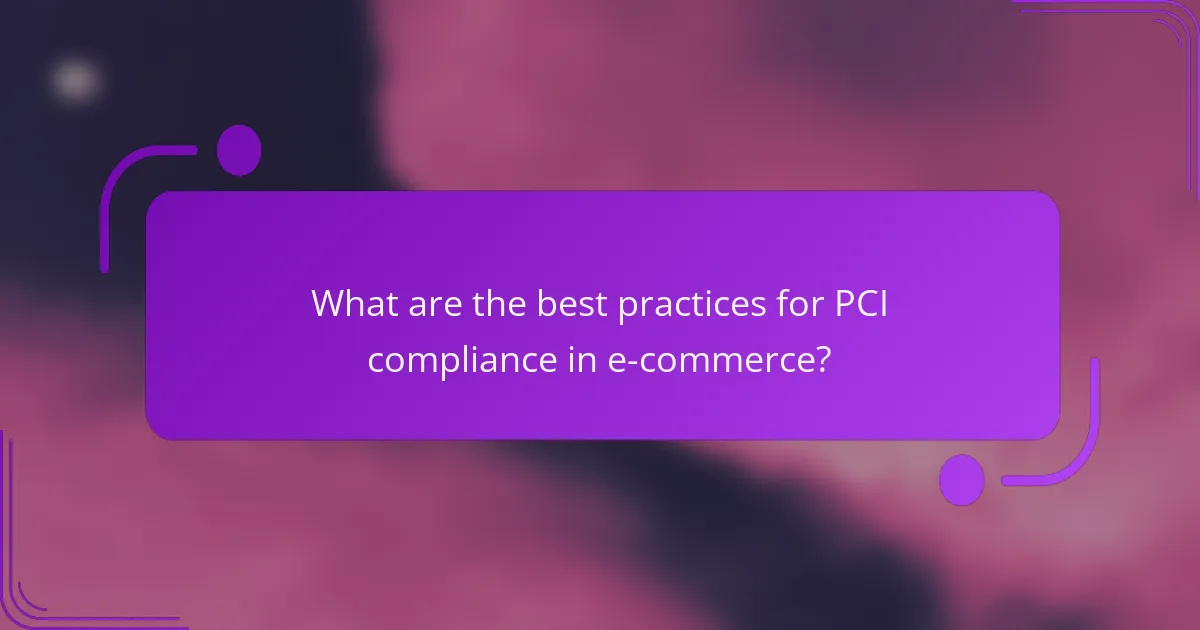
What are the best practices for PCI compliance in e-commerce?
To achieve PCI compliance in e-commerce, businesses should implement a set of best practices that ensure the security of cardholder data. These practices include strong access controls, regular network monitoring, maintaining secure infrastructure, encrypting data transmissions, and conducting security assessments.
Implement strong access control measures
Strong access control measures limit who can access sensitive cardholder information. This includes using unique user IDs, strong passwords, and two-factor authentication to ensure that only authorized personnel can access payment systems.
Additionally, regularly reviewing access permissions can help identify and revoke access for users who no longer need it, reducing the risk of unauthorized access.
Regularly monitor and test networks
Regular monitoring and testing of networks are crucial for identifying vulnerabilities and ensuring compliance. This involves conducting routine scans for security weaknesses and monitoring for any unauthorized access attempts.
Utilizing intrusion detection systems and maintaining logs of network activity can help businesses respond quickly to potential threats and maintain the integrity of their systems.
Maintain a secure network infrastructure
A secure network infrastructure is foundational for PCI compliance. Businesses should use firewalls to protect cardholder data and ensure that all systems are updated with the latest security patches.
Segmentation of networks can also enhance security by isolating sensitive data from less secure areas, making it harder for attackers to access critical information.
Encrypt transmission of cardholder data
Encrypting the transmission of cardholder data is essential to protect sensitive information during online transactions. Using protocols such as TLS (Transport Layer Security) ensures that data is securely transmitted over the internet.
Businesses should also ensure that any stored cardholder data is encrypted to provide an additional layer of protection against data breaches.
Conduct regular security assessments
Regular security assessments help identify vulnerabilities and ensure compliance with PCI standards. This includes conducting penetration testing and vulnerability assessments to evaluate the security posture of the e-commerce platform.
Engaging third-party security experts can provide an objective view of security measures and help implement necessary improvements to maintain compliance and protect customer data.
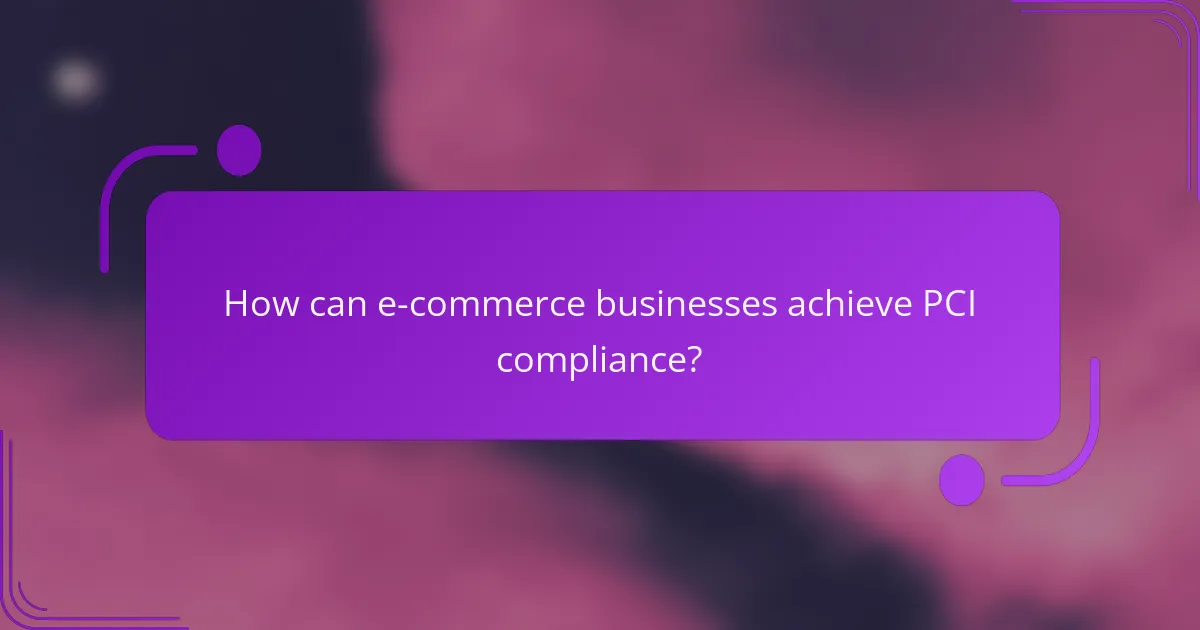
How can e-commerce businesses achieve PCI compliance?
E-commerce businesses can achieve PCI compliance by following a structured approach that includes assessing their current security posture, implementing necessary controls, and regularly reviewing their practices. This ensures that they protect customer payment information and meet industry standards.
Complete a self-assessment questionnaire
The self-assessment questionnaire (SAQ) is a critical first step for e-commerce businesses to evaluate their compliance with PCI standards. This questionnaire helps identify areas where security measures may be lacking and provides a framework for improvement.
Businesses should select the appropriate SAQ based on their transaction methods and payment processing systems. Completing the SAQ typically involves answering questions about security practices, data handling, and network security.
Engage a Qualified Security Assessor
Engaging a Qualified Security Assessor (QSA) can provide expert guidance in achieving PCI compliance. A QSA is certified to evaluate a business’s security measures and can offer tailored recommendations to address vulnerabilities.
While not all businesses are required to hire a QSA, those processing large volumes of transactions or handling sensitive data may benefit significantly from their expertise. A QSA can also assist in preparing for audits and ensuring that all compliance requirements are met.
Implement required security controls
Implementing required security controls is essential for maintaining PCI compliance. This includes measures such as encrypting payment data, using secure networks, and regularly updating software to protect against vulnerabilities.
Businesses should prioritize controls based on their specific risks and transaction volumes. Common practices include using firewalls, implementing strong access controls, and conducting regular security testing to identify and mitigate potential threats.
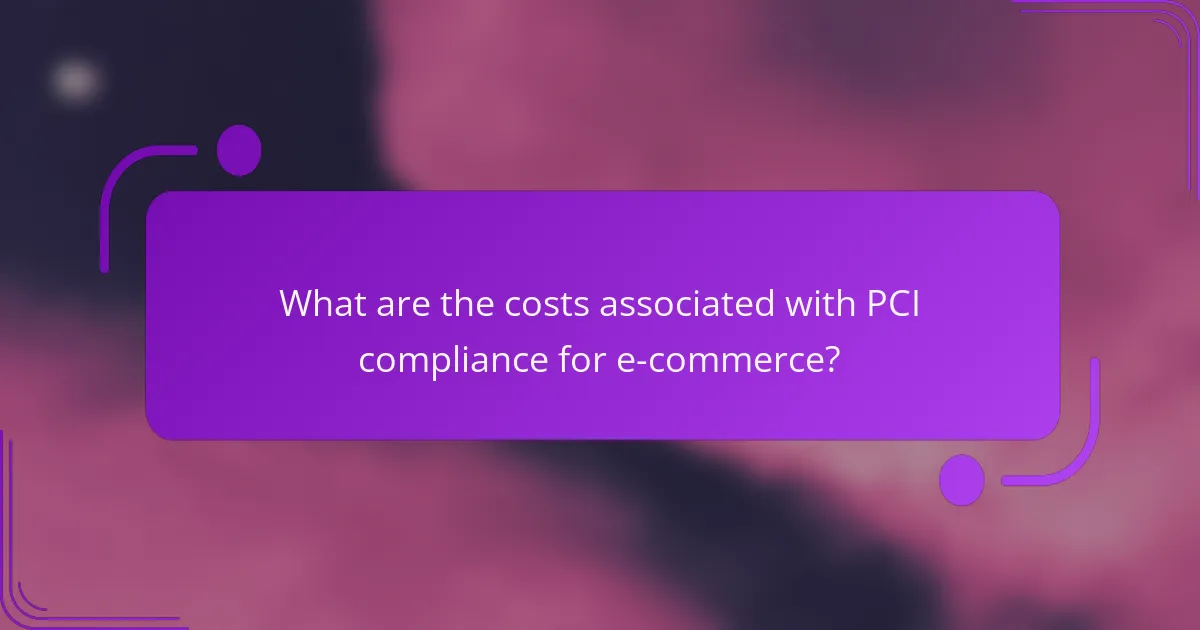
What are the costs associated with PCI compliance for e-commerce?
The costs associated with PCI compliance for e-commerce can vary significantly based on the size of the business and the complexity of its payment systems. Key expenses include security tools, compliance assessments, and potential fines for non-compliance, which can add up quickly if not managed properly.
Costs of security tools and software
Investing in security tools and software is essential for maintaining PCI compliance. Businesses may need to purchase firewalls, encryption software, and intrusion detection systems, which can range from a few hundred to several thousand dollars annually, depending on the scale of operations.
Additionally, ongoing maintenance and updates for these security solutions can incur further costs. It’s advisable to budget for both initial purchases and recurring expenses to ensure a robust security posture.
Fees for compliance assessments
Compliance assessments are necessary to verify adherence to PCI standards. Depending on the size of the business and the complexity of its systems, assessment fees can range from a few hundred to several thousand dollars.
Some businesses may need to hire external auditors or consultants, which can significantly increase costs. Regular assessments are crucial, so factor these fees into your annual budget to avoid surprises.
Potential fines for non-compliance
Non-compliance with PCI standards can lead to substantial fines, which vary based on the severity of the violation and the number of compromised records. Fines can range from thousands to millions of dollars, depending on the incident.
In addition to direct fines, non-compliance can result in increased transaction fees from payment processors and potential loss of business due to reputational damage. Prioritizing compliance can help mitigate these risks and protect your bottom line.
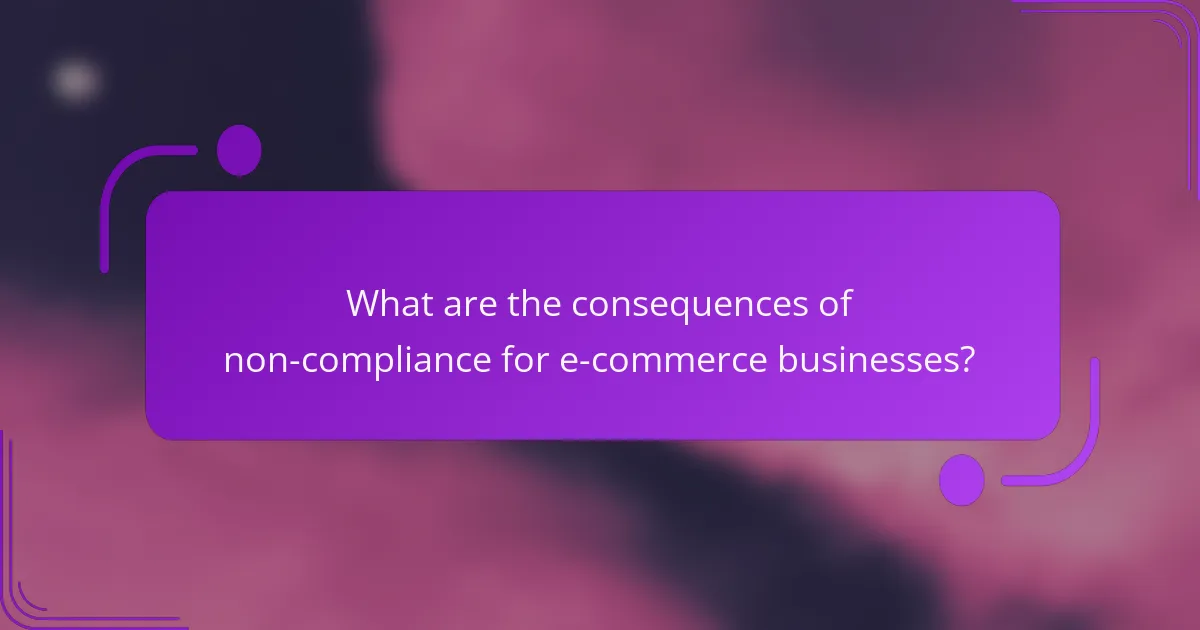
What are the consequences of non-compliance for e-commerce businesses?
Non-compliance with PCI standards can lead to severe consequences for e-commerce businesses, including data breaches, financial penalties, and a significant loss of customer trust. These repercussions can have lasting impacts on a company’s reputation and bottom line.
Risk of data breaches
Failing to comply with PCI standards increases the likelihood of data breaches, where sensitive customer information can be accessed by unauthorized parties. Such breaches can result in the theft of credit card numbers, personal identification, and other confidential data.
To mitigate this risk, e-commerce businesses should implement robust security measures, such as encryption, regular security audits, and employee training on data protection. Regularly updating software and systems can also help protect against vulnerabilities.
Financial penalties from card brands
E-commerce businesses that do not adhere to PCI compliance may face substantial financial penalties imposed by card brands. These fines can range from thousands to millions of dollars, depending on the severity of the non-compliance and the volume of transactions processed.
Additionally, businesses may be required to cover the costs associated with forensic investigations and remediation efforts following a data breach. It’s crucial to budget for these potential expenses to avoid financial strain.
Loss of customer trust
Non-compliance can severely damage customer trust, as consumers are increasingly aware of data security issues. A single incident of a data breach can lead to a decline in customer loyalty and a decrease in sales.
To rebuild trust, businesses must communicate transparently about their security measures and compliance efforts. Offering incentives, such as discounts or loyalty programs, can also help regain customer confidence after a compliance failure.
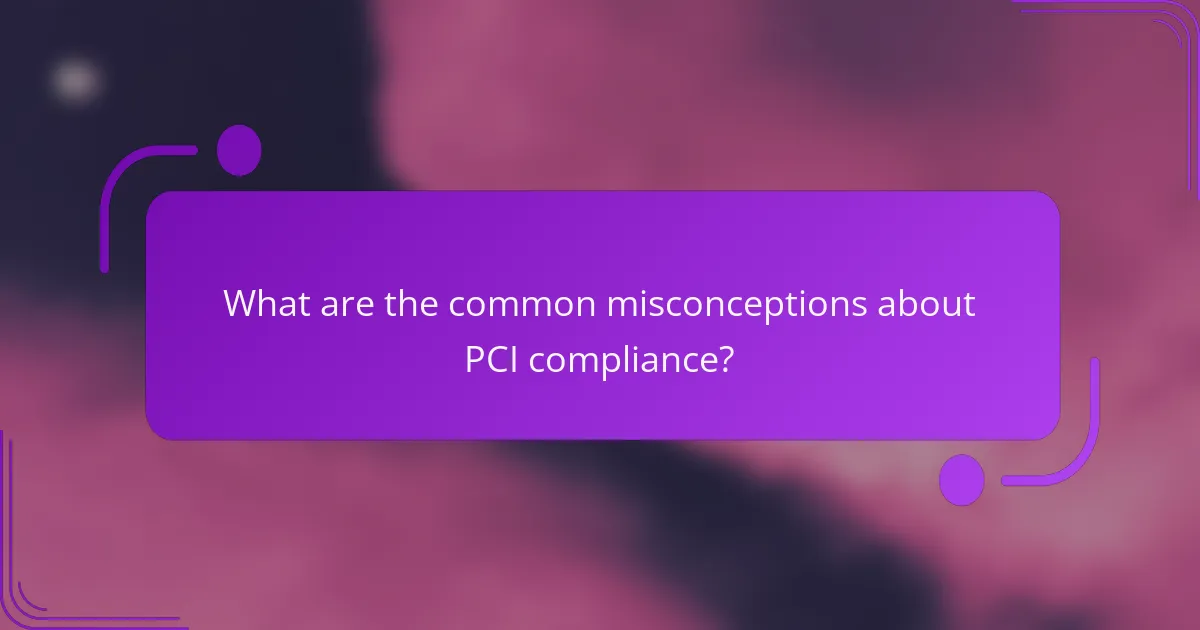
What are the common misconceptions about PCI compliance?
Many e-commerce businesses misunderstand PCI compliance, believing it only applies to certain companies or that it ensures complete security. In reality, PCI compliance is essential for all businesses that handle credit card transactions, regardless of size, and it is a framework designed to enhance security but does not guarantee it.
PCA compliance is only for large businesses
A common misconception is that PCI compliance is only necessary for large e-commerce businesses. However, any business that processes, stores, or transmits credit card information must comply with PCI standards, regardless of size. This includes small businesses and startups, which are often targeted by cybercriminals due to perceived vulnerabilities.
Small businesses should prioritize PCI compliance to protect customer data and avoid potential fines. Compliance can be achieved through various levels, depending on transaction volume, but all businesses must take steps to secure payment information.
Compliance guarantees security
Another misconception is that achieving PCI compliance guarantees complete security against data breaches. While compliance provides a framework for securing payment information, it does not eliminate all risks. Businesses must continuously monitor and update their security measures to address evolving threats.
To enhance security beyond compliance, businesses should implement additional measures such as regular security assessments, employee training, and using encryption technologies. Relying solely on compliance can lead to complacency, leaving businesses vulnerable to attacks.
